Thus, if you want to install anything on your wall, especially drywalls, you should make sure that you are putting the screws or nails in the studs instead of the wall. If the wall cannot withstand the weight of the appliance, like your TV or a heavy photo frame, the wall might come out entirely. While you can always find studs by the traditional guess and hammer method, you can find the precise location of the studs with the help of stud finders. Here are some things to keep in mind about stud finders.
Scanner Type: The type of stud used on the wall affects what type of stud finder you need to find them precisely. While most commercial buildings use metal or plastic studs, traditional houses have wooden studs. Therefore, various stud finders are calibrated accordingly to work for each type of stud. To ensure you are buying the right stud finder, you should check if it has the right sensor for the studs present on your wall.
Brand: The brand that designs the stud finder is a very important factor and you should not overlook that while buying a stud finder. There are a lot of internal components that are needed to design a stud finder such as the display unit, the sensor, and other intricate parts. If you are buying a stud finder from a reliable brand, you can rest assured that these components installed in the stud finder are of high-quality along with a durable exterior. Depth Range: This factor depends upon the thickness of the wall in your house. As you can see, each stud finder has a certain depth range until which it can detect the studs. After that, the stud won’t be detected even if you are getting the most expensive option if it does not have a suitable depth range. Therefore, you should first check the depth of walls in your house and buy the stud finder with an appropriate depth range.
Since it is pretty difficult to find the perfect position of studs in a wall, even small jobs like hanging a photo frame or a mirror on the wall can be really messy. To prevent that, we have gathered this list of the best stud finders available in the market right now. These options are selected on the basis of the factors mentioned above and some more. If you want to know more about stud finders and how they work, make sure you check out our Buying Guide for the best stud finders.
Best Stud Finders Table 2023
Best Stud Finders Reviews
1. Tavool Stud Finder Sensor Wall Scanner
We will start our list with one of the budget-friendly as well as multi-functional stud finders made by Tavool. It also happens to be the most popular option on this list because of its functionality. Coming in the first position, we have the Tavool Stud Finder. This is a 4-in-1 stud finder that supports up to 1.77 inches of wall thickness. As for its functionality, the Tavool Stud Finder has 4 different scanning modes designed for woods, beams, joists, and metals. It can also detect AC wires and other objects present deep inside the walls. As for the accuracy of the machine, you don’t have to worry about this device. Tavool has been designing stud finders for generations now and it has perfected the scanning technique by including advanced sensors on the Tavool Stud Finder. On top of that, the Tavool Stud Finder also features an LCD screen that can display the stud material as well as the accurate position of the stud behind the wall. Best Features
It is made by Tavool It offers a depth range of up to 1.77 inches It comes with a digital display Enhanced sensors for accurate results
Pros
Depth range is pretty good Suitable for experienced as well as novice workers 4-in-1 stud finder
Cons
It cannot be used to check level
2. CRAFTSMAN Stud Finder
Craftsman is a well-known brand for its high-quality as well as an affordable range of power tools and accessories. If you are looking for a cheaper stud finder, then the stud finder by Craftsman will certainly interest you. Our 2nd choice for the best stud finder is also one of the cheapest options available on this list. The Craftsman Stud Finder still offers ¾ inches depth range which is pretty good for standard drywall. And with this depth range, you can also use this device if you have wallpaper or fabric installed over your wall. The Craftsman Stud Finder operates on a single sensor that can detect the edges of the studs. However, there are no compromises made when it comes to the build quality of the Craftsman Stud Finder. It is a very durable device featuring a shock-resistant exterior design along with a strong grip on both sides. And since it is an electrical device with LED indicators, Craftsman also ensures water resistance on the Craftsman Stud Finder. Best Features
It is made by Craftsman It offers a depth range of up to ¾ inches Compact and simple device Cheapest option for a stud finder
Pros
Features LED indicators on the device Durable device Easy to use
Cons
It can only detect edges of the studs
3. Vivreal Stud Finder Wall Scanner
There is a lot of variety available in the market when it comes to advanced electronic stud finders. Out of which, the stud finder designed by Vivreal is one of the feature-rich options. Our 3rd choice for the best stud finders is the Vivreal Stud Finder. This is also a 4-in-1 wall scanner that makes up for its price tag. It features 4 scanning modes that can be switched depending on the type of wall you are using it or the type of stud you wish to locate. Since it is a powerful electronic stud finder, you will get a depth range of up to 2 inches on the Vivreal Stud Finder. On top of that, it includes a graphical LCD display that can pretty much create a perfect image of the stud, offering all necessary information like start position, end position, cross-section, and even center point. Apart from that, the display shows signal strength, calibration, battery indication, and much more. But, you probably won’t even need to check the display every time you use the Vivreal Stud Finder as it also has sound cues for when it detects a stud. Best Features
It is made by Vivreal It offers a depth range of up to 2 inches It comes with a digital display Powerful electronic stud finder
Pros
Detects metal, studs, wires, and other objects 4-in-1 stud finder Display of this device is pretty good
Cons
Comparatively expensive than other stud finders
4. Franklin Sensors FS710PROProSensor
Even though there are a lot of stud finders in the market, there are only a handful of options that are perfect for professional applications. Out of which, the following option from Franklin Sensors is probably the best one. The Franklin Sensors FS710PROProSensor is probably the most expensive choice you will find on our list of the best stud finders. But since it is a professional device, it offers a wide range of features that you won’t find with other options. First of all, it consists of 13 sensors in total that work simultaneously and deliver the precise position of the stud. The multi-sensor technology on the Franklin Sensors FS710PROProSensor also eliminates the necessity of calibration altogether. You can also use the Franklin Sensors FS710PROProSensor to detect multiple studs quickly, which is definitely needed while you are working on a professional project. But even with such a complicated design, using the device is fairly simple. All you will have to do is put the sensor on the wall and press a single button. It can be used for 0.75 to 1.5 inches thick walls and works on 2 AA batteries. Best Features
It is made by Franklin Sensors It offers a depth range of up to 1.5 inches Operates on 13 inches Gives complete information about stud position
Pros
Great option for quick and accurate results It can detect multiple studs simultaneously Built-in bubble level
Cons
Depth range should have been higher
5. Folai Stud Finder Sensor Wall Scanner
Folai also has a multi-functional stud finder on our list which is available at an affordable price tag. Folai also designs many other types of stud finders that you can find on their product page. Folai Stud Finder Sensor Wall Scanner is also a multi-functional stud finder that offers many additional features apart from basic stud detection. It can be used to detect metal pipes, AC wires, wooden beams, and even rebars. It has a large LCD display on the front that tells you all the information that you need to know about the stud, whether it is its position, cross-section, or center point. To maintain the accuracy of the Folai Stud Finder Sensor Wall Scanner, Folai has introduced advanced sensor technology on this device including an intelligent microprocessor chip so the results will be quick and fast. There are 5 scanning modes available with the Folai Stud Finder Sensor Wall Scanner offering the maximum depth range of up to 1.5 inches. And with the WireWarning detection feature, you can rest assured that there are no live wires where you are drilling, even in front of a stud. Best Features
It is made by Folai It offers a depth range of up to 1.5 inches It comes with a digital display 5-in-1 stud finder
Pros
Features a large LCD display and sound warnings It has 5 scanning modes Affordable multi-functional stud finder
Cons
It cannot be used to check level
6. JAXWQ Stud Finder Wall Scanner
Up next, we have one more versatile stud finder coming from JAXWQ. It is also a rather cheaper alternative for such a stud finder and popular amongst the community. The JAXWQ Stud Finder Wall Scanner is also a pretty great option when it comes to multi-functional stud finders. It also has 5 scanning modes including 3 modes for studs, 1 for AC wires, and 1 for metal construction behind the wall. And to generate accurate results, the JAXWQ Stud Finder Wall Scanner also operates on an intelligent microprocessor chip along with the sensors. The best feature of the JAXWQ Stud Finder Wall Scanner is its depth range. It can be used to detect studs up to 2.36 inches deep in the wall, which is admirable at this price. Another great feature of this stud finder is its LCD display. The JAXWQ Stud Finder Wall Scanner comes with a high-quality LCD display with a backlit design to properly display the results. It shows the structure of the stud, cross-section, depth, and even the center point. Due to the great feature set of the JAXWQ Stud Finder Wall Scanner, it can be an ideal choice for all types of users. Best Features
It is made by Jaxwq It offers a depth range of up to 2.36 inches It comes with a digital display 5-in-1 stud finder
Pros
It has 5 scanning modes LCD display with a backlit design Easy to handle and use
Cons
Requires batteries to work
7. The StudBuddy Magnetic Stud Finder
If you are wondering if you could find a stud finder that does not use batteries or any other external power source for that matter, you are in luck. The stud finder from StudBuddy will certainly interest you despite being a simple option. Instead of wasting quite a sum on an advanced stud finder that you will barely need in the future, you can make do with cheaper alternatives such as a StudBuddy Magnetic Stud. It is the simplest option on our list since it does not require any batteries or external power to operate. It comes with a built-in powerful magnet that acts as a detector for studs in your walls. All you will have to do is slide the unit across the wall and wait until it sticks to the wall, getting attracted to the metallic stud. And even if you want to use it to find wooden studs, you can do that as it will still get attracted to metallic nails and screws holding the wooden studs together. But, the depth range of this stud finder is very limited and it is only suitable for drywalls. Since you won’t be needing any batteries to power this device, its lifespan is technically endless. And on top of that, it is considerably compact compared to other options and can be used by anyone. Best Features
It is made by StudBuddy It does not require batteries Easy to use No calibration is required
Pros
Best choice for basic applications Cheap and compact stud finder Works for both metallic and wooden studs
Cons
Only suitable for drywalls
8. Jurgen K Stud Finder Wall Scanner
Getting back to electronic stud finders, we have a couple more options to show you that are designed by popular brands. Out of which, the Jurgen K stud finder can be a great choice for domestic applications. The Jurgen K stud finder is yet another great option available on this list that offers a wide range of features within a pretty decent price range. It also has 5-in-1 functionality like a couple of options we have seen before. Thus, you will find a lot of use for the Jurgen K stud finder such as for finding deep studs, AC wires, and even metallic beams and frames. The deep scan mode of the Jurgen K stud finder allows you to detect studs up to 1.5 inches deep studs in the wall whereas AC wire and metallic scan modes have a depth range of 2 and 2.1 inches respectively. The overall performance of the Jurgen K stud finder is pretty good thanks to the intelligent microprocessor powering the unit. It also has a high-end LCD screen that displays all the necessary information about the studs. Along with that, it also tells you about battery level and stud design. On the exterior, the Jurgen K stud finder features an ergonomic grip that makes it very easy to use. It also has auto-calibration that allows faster operation. Best Features
It is made by Jurgen K Auto calibration is available It comes with a digital display 5-in-1 multi-functional device
Pros
Can be used for AC wires and metal structures High-quality LCD display Accurate results with the microprocessor
Cons
Extra features might not be needed for drywalls
9. Homder Fun Stud Finder Wall Scanner
Homder Fun is a rather versatile brand on this list of the best stud finders. Apart from stud finders, you will find many types of accessories and tools designed by this brand. If you are sure that your walls are too thick for a basic stud finder, then you should go with the Homder Fun stud finder. This is one of the best options on this list in terms of depth range as it offers almost support for 2.36 inches thick walls. It also features an upgraded smart sensor that has a high sensitivity for detecting studs deep within the walls. Therefore, you will get accurate results from this stud finder, and much quicker compared to other options. There are 5 scanning modes available on this stud finder as well that let you detect studs, wires, and pipes inside walls. For calibrating the device, you will simply need to press a single button and wait until the calibration is complete. Until then, you will need to keep the tool steady and flat over the wall. The Homder Fun stud finder also works on ceilings and floors of a house apart from the walls. Best Features
It is made by Homder Fun It offers a depth range of up to 2.36 inches It comes with a digital display Cheaper option for a 5-in-1 stud finder
Pros
Offers multiple functionalities Upgraded smart sensor HD LCD display for clear results
Cons
Calibration is required before using the stud finder
10. Relaxoul Stud Finder Wall Scanner
Since we are now familiar with mid-range options for multi-functional stud finders, let us take a look at a cheaper alternative for a similar type of option. This stud finder is designed by Relaxoul which is famous for its stud finders. In the last place, we are including the Relaxoul Stud Finder Wall Scanner. While it offers more or less the same set of features as most other electronic stud finders, it is available at a pretty cheaper price tag. It is also a 5-in-1 stud sensor like many options we have seen on this list. But, the Relaxoul Stud Finder Wall Scanner has a depth range of up to 2.36 inches which is not that common. Plus, it has 5 scanning modes where 3 modes are for studs and the rest 2 are for AC scans and metal scans respectively. The Relaxoul Stud Finder Wall Scanner also has automated calibration modes that further save time while you are using the device. It also has an LCD display paired with audible sound alerts for when it detects the stud behind the wall. Since it is a cheaper option, it can be the perfect choice for DIY projects for your home or office. Best Features
It is made by Relaxoul It offers a depth range of up to 2.36 inches It comes with a digital display Display quality is very good
Pros
The depth range is pretty good Automatic calibration mode LCD display for clear visualization
Cons
It cannot be used to check level
Buying Guide For The Best Stud Finders
Stud finders are compact but handy electrical devices that let you find the accurate position of a stud behind your drywall so that you can drill a hole in the perfect position and get a safe and secure screw or nail installation that is needed for further applications. But to get the perfect results, you should find the best stud finder available in your budget based on its specifications and overall performance. You will find a variety of options on our list as well. Some options might feature a replaceable battery slot for portable usage, while some might need an AC power inlet for a more powerful performance. Since we have covered all the best options for stud finders right here, you can easily find the perfect choice under your budget right here. If you want to know more about stud finders, you can check our buying guide present right here. In this guide, we will talk about what you need to know before buying a stud finder and how you can select the best option by comparing some important characteristics of a stud finder.
1. Sensor Type and Count
Before you buy a stud finder, you should carefully check what type of sensor is used in its construction and how many sensors are available to get an idea about its performance. So far, there have been a lot of improvements in the design of a stud finder and technological advancements have offered a lot of upgrades over time. But, you will only get the benefits of these upgrades if appropriate sensors are installed in your stud finder. Apart from the type of sensor, it is also important to know how many sensors are working simultaneously to check the accuracy and precision of the results. If there is only one sensor available with the stud finder, it can only detect an edge of the stus which is not a lot of help. However, there are a few options that utilize multiple sensors so that you can get the exact location of studs, cross-sections, and even the center point for accurate drilling.
2. Extra Features
Even though stud finders are primarily designed to find studs behind a wall, there are some other functions that you may also find useful while working on your wall. Most of these additional features are available with electronic stud finders since they are powered by batteries and have some power to spare for additional sensors. But there are also some features that do not require additional power and can be found on even the most basic options. One such feature is the bubble-level indicator that allows you to draw a perfectly horizontal line on your wall that you will need while installing a shelf or a mounting accessory for your TV. The bubble-level indicator is however less accurate compared to professional level indicators and it is affected by external environmental factors. You may also find a built-in laser on some stud finders that guides you about the exact position of the stud above or below the sensor. It also acts as a level indicator and you can use it to align the fasteners for a better installation.
3. Depth Adjustment
With electronic stud finders, you will get a handy additional feature called depth adjustment which is unfortunately not present with simple magnetic finders. As the name suggests, this feature lets you decide the perfect mode for using the stud finder based on the type of wall you are using it on. If you have an adjustable depth sensor feature on your stud finder, you will be able to use the same unit for tiled walls as well as drywalls without any problems. While you are using the stud finder with an increased depth setting, it will consume more power, but detect studs even if they are behind a considerable thickness of the wall. It also compensates for the added thickness of the wall caused by carpets, paints, tiles, etc. But, make sure that you are not running the stud finder at this setting for a long time as it will consume more power and make you replace the batteries quicker than you would think.
4. Design and Functionality
While you are buying a stud finder, you should also take a look at its overall design aspect and consider the advantages or drawbacks caused by its design. For starters, your stud finder should have a proper grip if you want to move it swiftly across your wall and avoid any false results. Also, it helps a lot if the stud finder you are buying offers multiple functionalities such as wire detection, pipe detection, and so on. But, it is only possible if there are specific sensors available within the stud finders to perform the scan. Some stud finders also have a “center punch” feature that provides a small punch on the wall at the exact position where you would want to put the nail, e.g., the center point of the stud. Another great aspect of stud finders is an additional digital display apart from the laser or LED indicator. Having a visual display gives you a profound view of the interior design of your wall and helps you visualize the map of the stud position for a perfect job. Q. Is it possible to find studs behind a tiled wall? Technically, it is possible to find the approximate position of a stud behind a tiled wall with the help of a stud finder. But the results are not as reliable when it comes to a tiled wall compared to drywall. The reason behind that is the added thickness of the tiles which is not a problem with drywalls. Also, if you are thinking about kitchen or bathroom tiles, there is an additional gap between the wall and the studs kept from gas lines, water pipelines, etc. For tiled walls, you should invest in an advanced scanner with a greater depth range. Q. Do stud finders detect electrical wires? Even if you are buying an advanced stud finder, it will probably skip the part of the wall that has an electrical wire and only detect the stud, even if it is behind said electrical cables. For detecting electrical wires, metal conduits, or other similar entities, you should get an advanced stud finder with a magnetic sensor. You should also turn off power and water connection while using the stud finder for safe and precise operation. For these entities, an electric field scanner would probably not return any result. Q. Are magnetic stud finders better than electric ones? In comparison, electric stud finders are much better than magnetic stud finders and here’s why:
Electronic stud finders are comparatively more expensive in terms of stud detection than magnetic ones. Electronic stud finders are usually equipped with a digital display rather than a simple LED indicator that can pinpoint the position as well as the cross-section of the stud. Electronic stud detectors have a deeper depth range in comparison. Thus, these options can be perfect for a thick wall.
However, there are also a few drawbacks of the electric stud finders over magnetic ones such as:
Electronic stud finders are comparatively more expensive than magnetic ones due to added functionality and preciseness of the results. Electronic stud finders need a power supply such as batteries or an AC power outlet. And, these options will require quite frequent battery replacements since they consume more power.
Conclusion
The stud finders that we have enlisted on this guide are the best options that you can find right now and also some of the most trusted options that are currently being used by many DIYers and even professional workers. While some options offer the best features in the premium category, some options will offer surprisingly great specifications even at an affordable budget level. Since there is a wide range of options available on this list, you can easily choose the perfect option as per your needs. We have also offered more information on the stud finders in our buying guide. If you need any further help, you should take a look at these options which are handpicked from our list of the best stud finders. If you want the cheapest and most easy-to-use option from our picks, we will recommend going with the StudBuddy Magnetic Stud Finder. Unlike almost all other options, this is a simple magnetic stud finder designed to work on drywalls. It can find metalling studs pretty easily as it will stick to the part of the wall that has a stud behind it. Even if you are looking for wooden studs, it will still stick to the surface thanks to the nails in the wooden studs. It does not require any battery or power to operate. For professional applications, basic options will simply not offer good enough results. Therefore, our next recommendation is the Franklin Sensors FS710PROProSensor. It is a highly professional option as it works as both a stud finder as well as a level adjuster. All you will need to power this unit are 2 AA batteries that are easily available everywhere. It offers a 0.75 to 1.5 inches depth range, making it the right option for thick walls. Plus, there are 13 sensors working within the Franklin Sensors FS710PROProSensor to detect multiple studs precisely. If you have an even thicker wall, you should consider going with the JAXWQ Stud Finder. There are only a handful of options available in the market that offer the depth range of up to 2.36 inches which is quite deep and makes it suitable for thick walls. For that, it encompasses an intelligent microprocessor chip with high sensitivity to offer proper results. Plus, you will also have an LCD display on the JAXWQ Stud Finder to check your results. Comment * Name * Email * Website
Δ



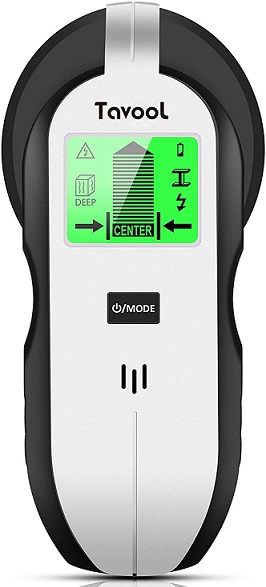
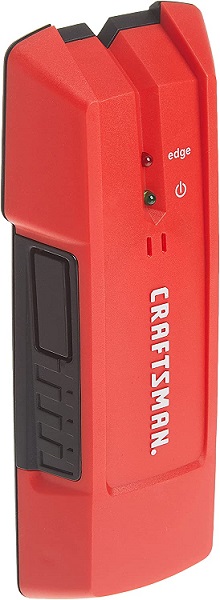
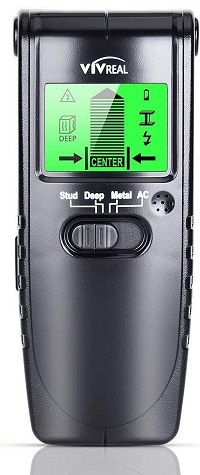
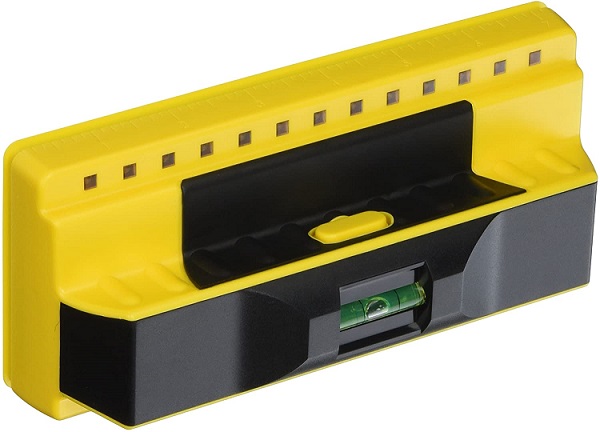
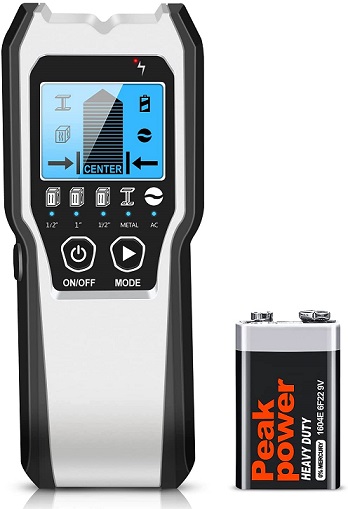
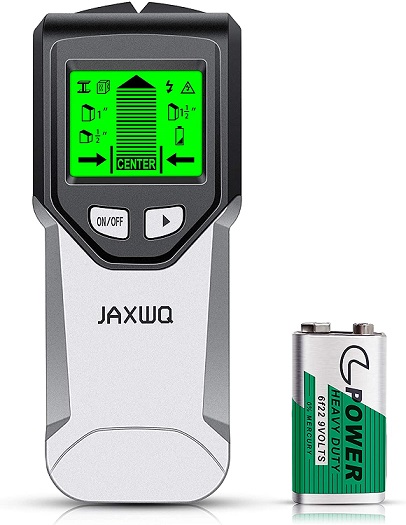

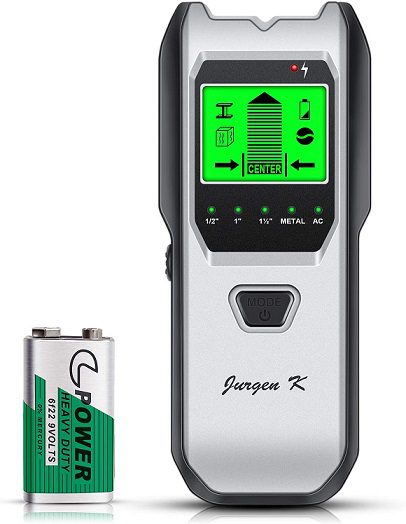
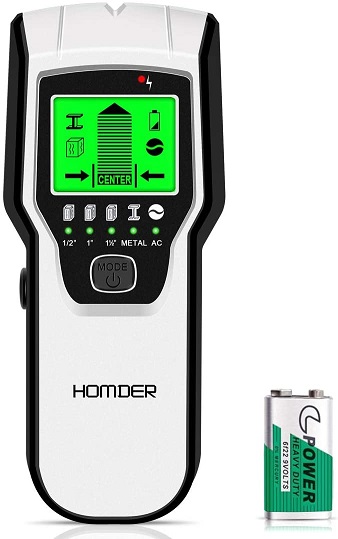
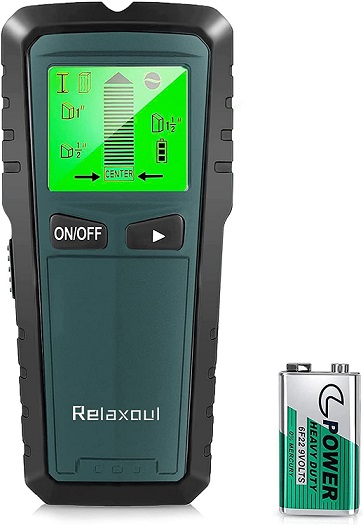


![]()